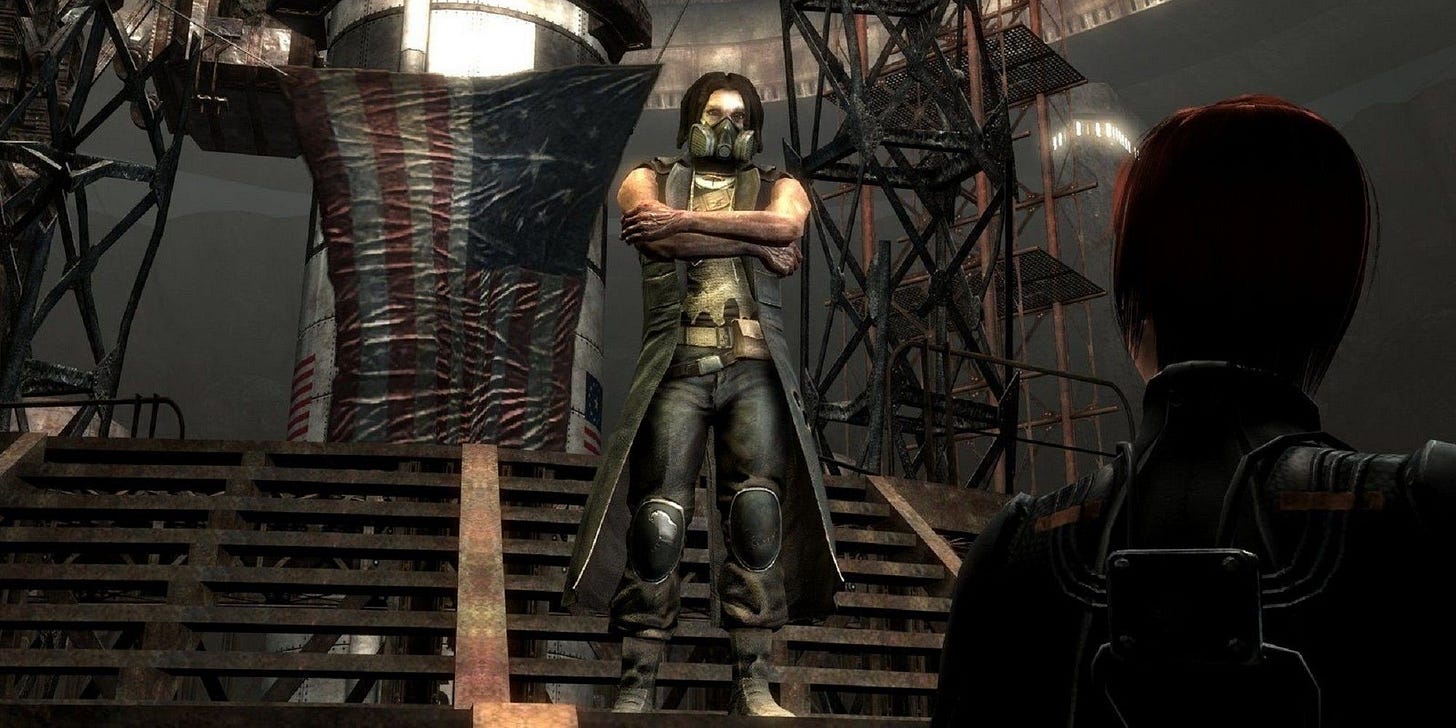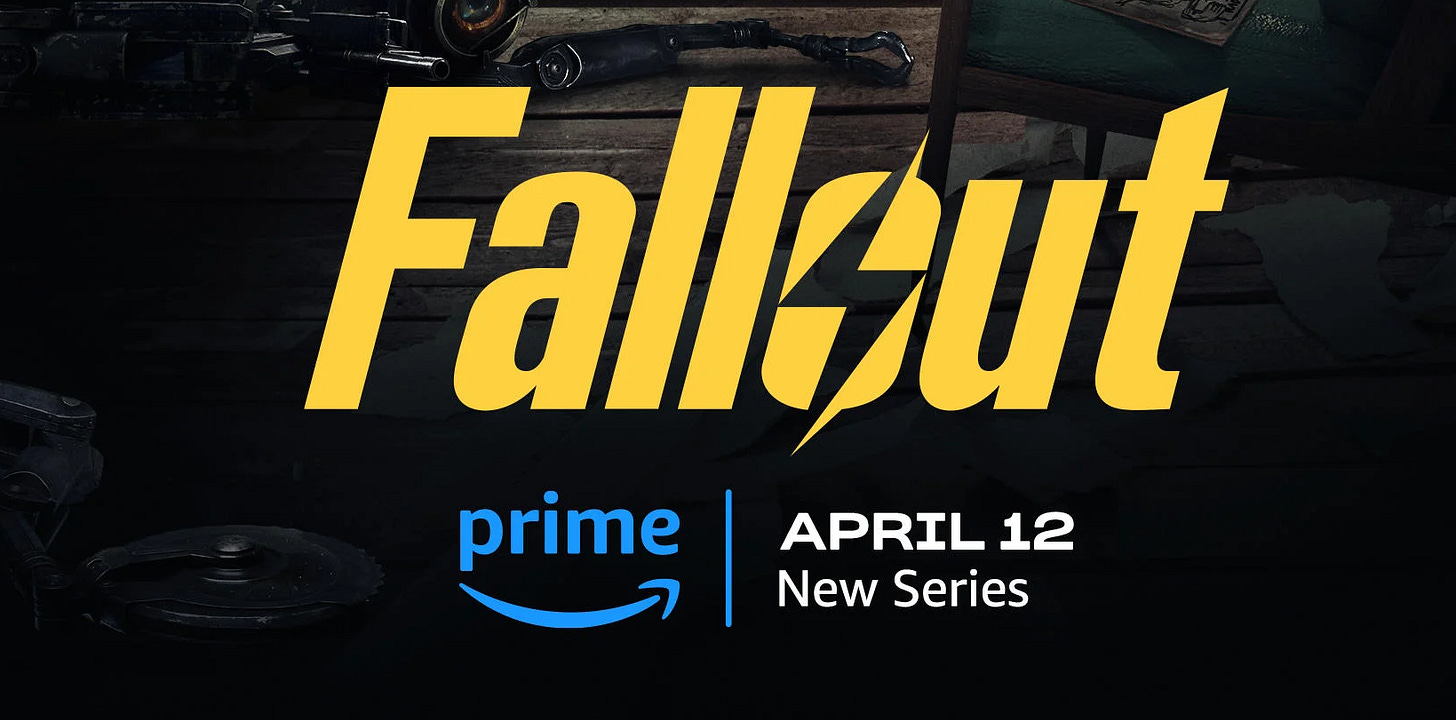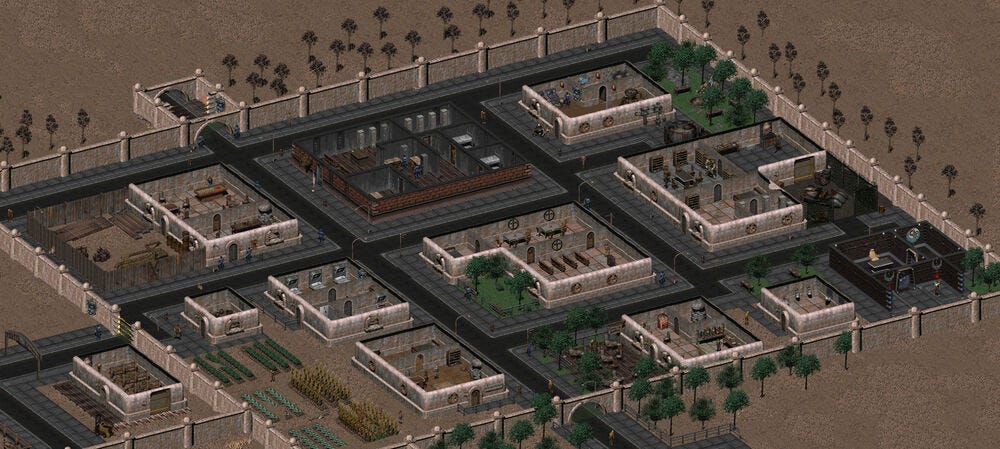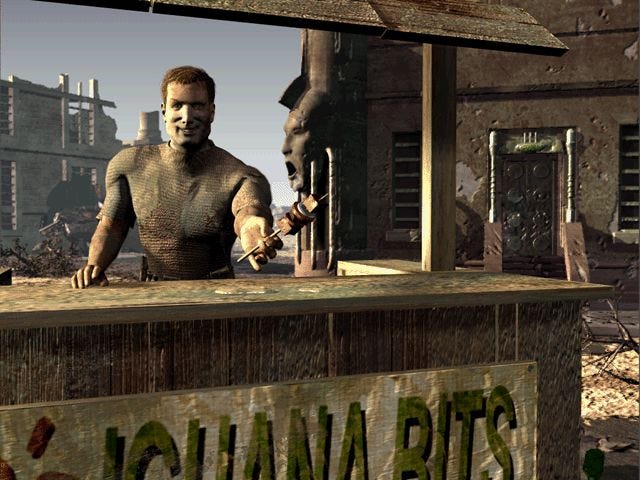Nihilism as a cultural doctrine can be an incredibly useful political tool: a population trained to accept that their lot in life will never improve, is a population much less likely to challenge your legitimacy of governance or make material demands. In the 5th year of the COVID-19 pandemic, America has been trained to accept endless infections with SARS-CoV-2: a virus that has killed & crippled millions of their fellow countrymen, in what is now widely described a "post-pandemic" return to “normalcy:” an artificial construction rooted in toxic positivity and a willful ignorance of the long-term harm that future bouts of COVID-19 may leave upon their bodies.
As part of this "post-COVID" "new normal," there's a new Amazon streaming series based off of the long-running Fallout franchise, which started off as a role-playing post-apocalyptic adventure game in 1997, nearly three decades ago. Let’s get you up to speed, Wastelander.
1. A Condensed History of Fallout
When building a believable science fiction universe, you have to account for the reality that advancements in communications technology has been one of the greatest drivers in political evolution over the entirety of human civilization. Tribes and the spoken word. The Roman Empire and the written word. The printing press and the French and American Revolutions - the list goes on. The turn of the millennium had its own major technological break - videogames were evolving as a medium in narrative presentation. Fallout, Deus Ex, and Metal Gear Solid were breaking new ground in storytelling potential - and exposed players to new forms of interactivity, new philosophical ideals, political commentary, and even allowed them to engage with moral and ethical challenges with unforeseen consequences. Deus Ex, which we'll come back to on a later date, was actually about a global pandemic and various conspiracies.

1998's Fallout 2 by Black Isle was about navigating a post-post apocalypse setting, in the aftermath of a nuclear holocaust. Taking on the role of a villager tasked with acquiring a MacGuffin to save his dying home, you wander the desert sands between California and Nevada, drifting from community to community - all with their own unique problems. As the wandering hero, you can help resolve these common people's struggles over food, mining, outside political influence, and even slavery. Early in your journey, you are tasked with rescuing a trader named Vic from a "Slavers Guild" in the bombed-out, crime-ridden slum known as "The Den."
After liberating Vic from his former captors, you journey together across the desert to "Vault City" in search of aforementioned MacGuffin and discover a "utopia" (according to Vault City) with stability and prosperity abound. Even better, they've outlawed slavery! However, they do have... "servants." Who are, as a matter of fact, just slaves - but rebranded. Even better, the government of Vault City gets really mad at you for pointing this out! It's a sharp, clever piece of political satire about the legitimacy of the state getting away with horrific exploitation, all thanks to some clever wordplay.
In the context of COVID-19, the American public of 2021 didn't really offer much serious pushback to a similar rebranding campaign of making COVID-19 “mild,” and their institutions declaring that the citizenry needed to essentially surrender to pestilence. The public was organized to ignore the culminating risks for crippling disability from “mild” infections - especially in children. Much of the public simply shrugged and assumed the best of a government helmed by a man who once falsely claimed, alongside the Bush administration, that Iraq had weapons of mass destruction as justification for a war that led to countless atrocities. Now, families across America are wondering why their children are constantly ill, with the unscientific laptop pundit class rewriting history to justify their current plight. You can see this same sort of rationalization with Vault City's downtrodden "servants."
Fallout 2, for the majority of players, ends on some variation of a relatively positive note with a new nation, the New California Republic, expanding its reach over the remnants of a post-nuclear wasteland. For a lot of interactive media in this era, stories genuinely concluded with an upbeat look forwards, as America gazed upon the new millennium with wonder and awe of what might be possible beyond the 1000s.
3. Project for a New American Fallout
Alas, humanity did cross that Rubicon into a bold new millennium, and Fallout's wit was quickly lost to time. American culture would suffer through the horrors of the Bush years - the Patriot Act, the atrocities in the Middle East, the torture camps of Guantanamo Bay and Abu Ghraib...Americans became a people much more bloodthirsty, much less curious, and far more tolerating of obscene repression from their government. In the mid-2000s, the Fallout intellectual property would be snatched up by Bethesda Softworks, an RPG developer which had just made a splash with fantasy blockbuster The Elder Scrolls IV: Oblivion... a notable downgrade from its predecessor, Morrowind, which presented a unique and foreign adventure that explored bizarre, sometimes cosmic realms. Chasing the success of the Lord of the Rings trilogy of films, Oblivion was a much more generic & uninspired adventure.
Which brings us to 2008, and Bethesda releases Fallout 3 - the first mainline installment in over a decade, with a new developer bringing a fresh take on the series to a console audience...and of course, it's a critical & commercial success. It's also probably the most nihilistic "reboot" of a franchise in quite some time. Gone is Fallout 2's optimism that humanity would manage to eventually progress "past" the nuclear apocalypse. Forgotten are the moral complexities of navigating this new, "post-post apocalypse" civilization. Instead, the first town you encounter is called Nuketown - it's utterly devastated, and there's simply two choices: Defuse the nuke, or detonate this nuke in the middle of a small town full of utterly forgettable civilians. The apocalypse of the role-playing game was upon us:
Fallout had become little more than a broken-down, gory sideshow carnival full of cheap thrills, utterly devoid of substance.
One could erect an entire monolith (see the linked video above) detailing every single horrific flaw in Fallout 3 - but let's quickly summarize the central adventure instead. In Fallout 1 & 2 you leave your home to find a central MacGuffin to save the future of your community. In Fallout 3, you abandon your home in pursuit of your father, as voiced by Liam Neeson. This is a massive tonal shift - the hero off to survive and rescue not only their family, but their friends and community - is instead reduced to chasing after a loved one. The problem with games, is that... if they fail to connect the player to said family figure, then the whole emotional hook fails to land.
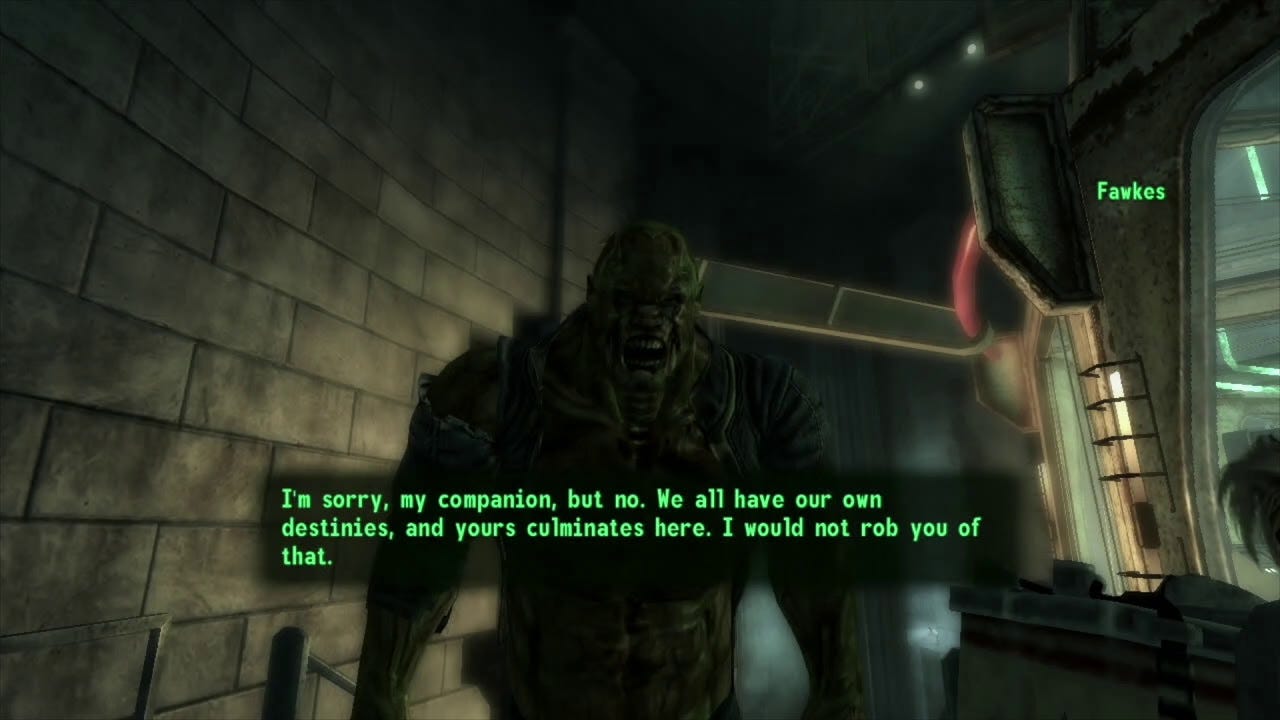
During your Quest for Father, you'll encounter a friendly "Super Mutant" named Fawkes to take on as a companion. Super Mutants are immune to radiation. In the final moments of Fallout 3's central story, you are asked to enter a room full of a deadly radiation to flip a switch and save the wasteland of post-nuclear Washington, D.C. Naturally, you would turn to Fawkes and ask him for help, being immune to radiation and all, but he will simply respond, "I'm sorry, my companion, but no. We all have our own destinies, and yours culminates here. I would not rob you of that." ...Yes, that is precisely the end of Bethesda's first Fallout game. For paying attention to the story and universe of Fallout, Bethesda chooses to slap you in the face and ridicule you for caring about the story they sold you for $59.99 USD.
The backlash was so severe that Bethesda Softworks was forced to revise the ending. Now the ending monologue, narrated by famous actor Ron Perlman, simply refers to you as a coward for this same crime of paying attention to the story and making smart choices. Even better - when Bethesda released a post-launch expansion set in Pittsburgh, they went on to further revise the ending by declaring that you would have survived exposure to deadly radiation either way, making the choice irrelevant. This is the message of a 30-50 hour adventure across the capital district of a post-nuclear United States: Don't even bother taking anything seriously. This was the great cultural revolution of the Bush Administration, realized.
Classic Fallout had its fair share of black humor and comical, over-the-top gore displayed in stylized animation sprites sprinkled along your adventure - the appetizers to your five-course-meal of navigating moral & ethical challenges - while Bethesda’s Fallout made millions from supersizing the kiddy menu. The banality of managed decline that was the Obama/Biden Administration began to sunset at the end of 2015, with Fallout 4 releasing - yet again staged on the Eastern Seaboard around Boston. We're not doing this whole song and dance of a miniature "review" again - here's what you need to know: Instead of chasing after your dad, you're chasing after your son. Also, you have to build houses now. It’s not even a role-playing-game anymore - Fallout has tragically become a brainless “looter shooter;” loading a rucksack with a disorganized mountain of largely useless garbage. An apt metaphor for the modern American economy, really.
4. Gazing Upon a Radiated Silver Screen
Between Fallout 4 and the Fallout Amazon show, America is faced with a Presidency helmed by a crooked reality gameshow host, and a once-in-a-century global pandemic disaster that, now in Spring 2024, has killed and crippled countless millions around the globe - with the Economist estimating a global death toll of over 30 million. A historic event that many are quickly longing to forget. Thankfully, Billionaire Philanthropist Jeff Bezos has arrived to lead America on the Golden Path with some upbeat inspira... no.
Fallout (2024) the streaming series is a very loving tribute to the four Bethesda games (3, 4, 76, and Shelter) produced under the Fallout brand. All of your favorite icons from those games are present in this show and given the proper affection. Doubling down on the retro Atomic Age 50s aesthetic & catchy old-timey jingles. Even more painfully for a dedicated contrarian such as myself, the actors do a solid job with the material, and the show is competently put together. However, the overarching narrative of the Fallout series is watching the Bethesda brand descend upon the Cali-Nevada desert like an invading army, crushing all opposition, and flattening whatever existed before - all to erect another gory carnival sideshow devoid of real substance.
It's soon made clear that, for the majority of people that played & completed Fallout 2, absolutely nothing remains from their adventures across the California-Nevada desert. The New California Republic is a distant memory. Any trace of "civilization" has degraded into freefall, and bloodthirsty anarchy is yet again the norm of the wasteland. The Brotherhood of Steel (BoS), established in Fallout 1 & 2 an isolationist faction of technology preservationists, is now a dominant military force in the region - mirroring Bethesda's East Coast BoS with a steady stream of power-armored stormtroopers stomping across the land, lording over the downtrodden from above in their "vertibird" gunships.
Everything must be "brand-consistent" for Bethesda's vision of Fallout America: Nothing can progress, nothing can ever get better. Everything must remain a despondent wasteland of ruin for cheap thrills, shallow entertainment, and interpersonal narratives that you've seen a hundred times before. The writers confirm as such when justifying the flattening of any civilization that emerged after the events of Fallout 2 & Obsidian’s Fallout: New Vegas:
I will say that it was very, very early in the decision [making process], once we decided to put the show in L.A. That was the very next thought, because it's a post-apocalyptic show. And if you study the Western, which has a lot in common with the post-apocalyptic genre, ‘civilisation is not around’ is a big part of it. A lot of them end with the railroad coming through, or a house being built, or they put a church up in the town, or a motorcar appears. And you're like, ‘Well, the wild wild west is over.’
Which is then followed up with:
Guys, the world has progressed, and the idea that the wasteland stays as it is decade-to-decade is preposterous to us. It’s just a place [of] constant tragedy, events, horrors — there's a constant churn of trauma.
This is the "new normal" that Todd Howard & Co. have erected, and any inconsistences or deviations from this ideal must be stamped out. With the aid of billionaire Jeff Bezos and his Amazon empire, we are bearing witness to a coordinated assault on American culture and what working class families are to expect in "post-pandemic" America. You will accept that everything will only get progressively worse.
4. A Crimson Caravan to Nowhere
Classic Fallout was, at its core, a story about building communities - as the player travels from one to the other, and helps resolve (or exploit) their assorted, tangible problems, he or she is leaving this post-disaster world a better place whilst saving their own community. Bethesda Fallout, on the other hand, is an entirely individualist experience that treats everything around them as mere playthings to explode and exploit for their own entertainment or benefit. This is the "normal" that the ownership class seeks to impress upon society - a divided people are easier to exploit.
Which brings us back to this "post-pandemic" "new normal" in which the current public health guidance from the American government is "You Do You." No real mandates, hardly any serious recommendations. Ashish Jha, Leana Wen, Paul Offit, and all the rest of the public health influencer class have dictated to the public, on behalf of the ownership class, that you, and your children, "have to accept [constant] illness," when all of them are either sadistically dishonest or willfully ignorant about the long-term harms of even "mild" SARS-CoV-2 infections which have upended the lives of millions of Americans - driving many to poverty, homelessness, and even deaths of despair. Sadly, these poor souls are not factored into the “We” of Paul Offit’s claim that “we have to accept [constant] illness.”
The message is thus: Everything for you, your children, and your community will be a fruitless agony that we shall exploit for our personal gain. You will be constantly ill, and the entertainment we deem suitable for you will be devoid of emotional nourishment and intellectual substance. You can't be part of a community - you are little more than our property as a worker, and you should adjust your expectations accordingly. Those things you loved and held dear, will be repackaged and sold back to you, but as a vastly inferior pastiche - actively replacing what you once held dear.
The fallout of the COVID-19 pandemic is very much a wasteland, and it will remain so until we stop thinking only of ourselves and start rebuilding the public’s health.




